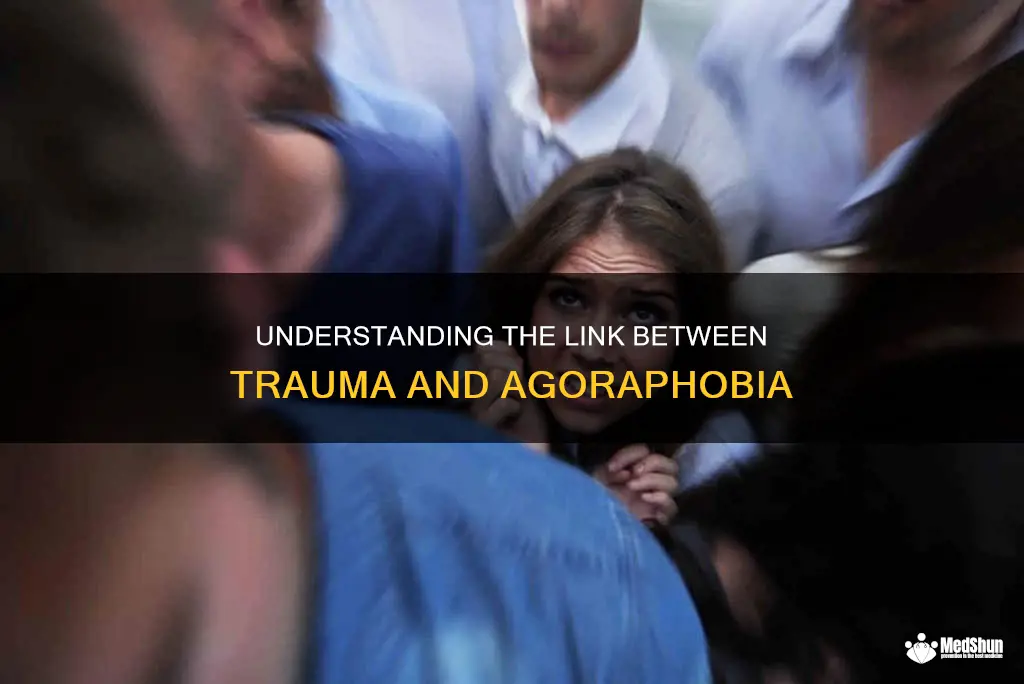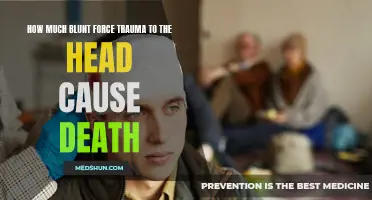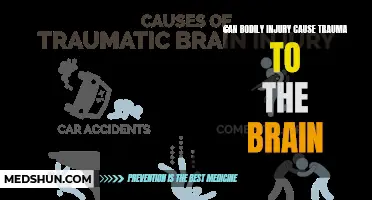
Imagine a life where even the thought of leaving your home sends you into a tailspin of anxiety and fear. This is the unfortunate reality for those who suffer from agoraphobia, a debilitating disorder that severely limits one's ability to engage in everyday activities. While the exact cause of this disorder is still widely debated, there is growing evidence that suggests a strong connection between agoraphobia and past trauma. In this article, we will explore the potential link between trauma and the development of agoraphobia, shedding light on a topic that has long remained in the shadows.
| Characteristics | Values |
|---|---|
| Disorder | Agoraphobia |
| Possible cause | Trauma |
| Definition | Agoraphobia is an anxiety disorder characterized by an intense fear or anxiety about being in situations or places where escape might be difficult or embarrassing, or where help may not be available. |
| Symptom | Panic attacks, fear of open spaces, fear of crowded places, fear of leaving home, fear of being alone |
| Possible traumatic events | Traumatic events such as accidents, physical or sexual abuse, witnessing violence, or experiencing a life-threatening situation |
| Onset of symptoms | Symptoms may start immediately after a traumatic event or may develop gradually over time |
| Co-occurrence with other conditions | Agoraphobia often co-occurs with other anxiety disorders, such as panic disorder or generalized anxiety disorder |
| Treatment | Treatment may include therapy, such as cognitive-behavioral therapy (CBT), medications, and exposure therapy |
| Prognosis | With proper treatment, many people with agoraphobia can manage their symptoms and lead fulfilling lives |
What You'll Learn

Definition and Symptoms of Agoraphobia
Agoraphobia is a complex anxiety disorder that is characterized by an intense fear of being in situations or places from which escape might be difficult or embarrassing, or where help may not be available in the event of having a panic attack or experiencing other distressing symptoms. People with agoraphobia often avoid leaving their home or familiar surroundings due to their fear and anxiety.
While the exact cause of agoraphobia is not fully understood, experts believe that a combination of genetic, environmental, and psychological factors may contribute to its development. Trauma is one possible factor that can lead to the development of agoraphobia.
A traumatic event can have a profound impact on an individual, often causing significant distress and disrupting their ability to cope with everyday life. Trauma can come in many forms, such as physical assault, sexual abuse, accidents, natural disasters, or witnessing or experiencing a life-threatening event. These traumatic experiences can leave a lasting impression on the individual, leading to the development of various anxiety disorders, including agoraphobia.
The link between trauma and agoraphobia lies in the fear response. When a person experiences trauma, their brain and body go into overdrive, releasing stress hormones like cortisol and adrenaline. This heightened fear response can become associated with certain situations or places, leading to a conditioned fear response.
For example, someone who has experienced a traumatic event in a crowded place, such as a mass shooting or a terrorist attack, may develop agoraphobia due to the fear of being in similar situations again. They may associate crowded places with danger and may avoid them altogether to prevent experiencing the intense fear and anxiety associated with the traumatic event.
The symptoms of agoraphobia can vary from person to person, but they typically include:
- Fear of being in crowded or enclosed spaces
- Fear of being in open spaces or outside of the home
- Fear of using public transportation
- Fear of being alone
- Fear of being in places where escape may be difficult
- Anxiety or panic attacks when faced with feared situations
- Avoidance of situations that trigger anxiety
It is important to note that while trauma can be a contributing factor in the development of agoraphobia, not everyone who experiences trauma will develop the disorder. Other factors, such as genetic predisposition, personality traits, and a history of anxiety or panic disorders, may also play a role.
If you or someone you know is experiencing symptoms of agoraphobia, it is important to seek help from a mental health professional. Treatment options for agoraphobia may include therapy, medication, or a combination of both. Therapy, such as cognitive-behavioral therapy (CBT), can help individuals identify and challenge their fears, develop coping strategies, and gradually face their fears in a controlled and supportive environment.
Remember, agoraphobia is a treatable condition, and with the right support and treatment, individuals can learn to manage their fears and regain control of their lives.
Understanding How Trauma Can Impact Attention Deficit Disorder
You may want to see also

The Relationship Between Trauma and Agoraphobia
Agoraphobia is an anxiety disorder characterized by a fear of places or situations that may cause feelings of panic or embarrassment. People with agoraphobia often avoid going outside or being in crowded places, which can significantly impact their daily lives.
Although the exact cause of agoraphobia is still not fully understood, it is believed to be a complex interplay of various factors, including genetic predisposition, brain chemistry, and environmental influences. One such environmental influence that can contribute to the development of agoraphobia is trauma.
Trauma refers to a deeply distressing or disturbing experience that overwhelms an individual's ability to cope. It can occur as a result of a single traumatic event, such as a natural disaster or a car accident, or it can be chronic, such as ongoing abuse or neglect. Trauma can have a profound impact on a person's mental health and may lead to the development of various anxiety disorders, including agoraphobia.
When someone experiences a traumatic event, their brain and body go into a heightened state of arousal, preparing them to respond to the threat. This response is commonly known as the fight-or-flight response. However, in some cases, the trauma may be so overwhelming that it disrupts the normal functioning of this response system. As a result, the person may develop an exaggerated fear response, not only to the original trauma but also to potential triggers that remind them of the traumatic event.
In the context of agoraphobia, trauma can play a significant role in the development of the disorder. For example, if someone experienced a traumatic event in a crowded place, they may develop a fear of similar situations or places. This fear can then lead to avoidance behaviors, where the person tries to control their environment to reduce the likelihood of encountering situations that trigger their anxiety and panic. Over time, this avoidance behavior can escalate, ultimately leading to agoraphobia.
It is worth noting that not everyone who experiences trauma develops agoraphobia, and the relationship between trauma and agoraphobia is not fully understood. Some individuals may be more genetically predisposed to developing anxiety disorders, including agoraphobia, while others may have certain personality traits that make them more susceptible to developing agoraphobia following a traumatic event.
Regardless of the exact mechanism, it is clear that trauma can be a significant risk factor for the development of agoraphobia. If you or someone you know has experienced trauma and is now struggling with agoraphobia or other anxiety disorders, it is crucial to seek professional help. A mental health professional can work with you to address any underlying trauma and develop effective coping strategies to manage agoraphobia symptoms. Therapy approaches, such as cognitive-behavioral therapy (CBT) and exposure therapy, have been proven to be effective in helping individuals with agoraphobia regain control of their lives and overcome their fears.
In conclusion, while the exact cause of agoraphobia is still unknown, trauma is believed to be a significant contributing factor. Traumatic events can disrupt the normal fear response system and lead to the development of exaggerated fears and avoidance behaviors. If you or someone you know is struggling with agoraphobia and has a history of trauma, seeking professional help is essential for managing symptoms and improving quality of life.
What Transpired in Trauma Room 1 on November 22, 1963?
You may want to see also

Types of Trauma That Can Trigger Agoraphobia
Agoraphobia is a type of anxiety disorder in which individuals develop an intense fear of being in situations or places from which escape might be difficult or embarrassing. This fear often leads to avoidance behavior, and individuals with agoraphobia may become confined to their homes or only venture out into familiar and safe environments.
While the exact cause of agoraphobia is not fully understood, it is believed to be a complex condition with multiple factors contributing to its development. One such factor is trauma. Trauma refers to a deeply distressing or disturbing experience that overwhelms an individual's ability to cope and leaves a lasting impact on their mental and emotional well-being.
There are several types of trauma that can potentially trigger agoraphobia:
- Violent or Physical Assault: Individuals who have experienced physical assault, such as a mugging or rape, may develop agoraphobia as a result of the fear of encountering similar situations again. The trauma caused by the assault can lead to a heightened sense of vulnerability and a reluctance to venture into public spaces.
- Car Accidents: Being involved in a severe car accident can have a profound impact on an individual's sense of safety. The trauma associated with the accident may trigger agoraphobia, as individuals may develop a fear of driving or being in a vehicle, leading to avoidance of travel and public spaces.
- Natural Disasters: Surviving a natural disaster such as an earthquake, hurricane, or flood can be a traumatic event that leaves lasting psychological effects. Individuals who have experienced such disasters may develop agoraphobia due to the fear of being trapped in dangerous situations or encountering similar disasters in the future.
- Witnessing Violence or Traumatic Events: It is not always necessary for an individual to directly experience a traumatic event to develop agoraphobia. Witnessing violence or traumatic events, such as a terrorist attack or a mass shooting, can be equally distressing and lead to the development of agoraphobia.
- Emotional Abuse or Bullying: Trauma from emotional abuse or bullying can also contribute to the development of agoraphobia. Constant and prolonged exposure to such negative experiences can erode an individual's self-esteem and confidence, leading to a fear of being judged or humiliated in public.
It is important to note that not everyone who experiences trauma will develop agoraphobia. The way each individual responds to trauma is highly subjective and can vary depending on various factors such as their personality, support system, and coping mechanisms.
If you or someone you know is struggling with agoraphobia or any other mental health issues related to trauma, seeking professional help from a therapist or counselor trained in trauma-focused therapy can be beneficial. They can provide the necessary guidance and support to help individuals process their trauma and develop healthier coping strategies to manage their agoraphobia symptoms. Remember, recovery is possible with the right support and treatment.
The Potential Inheritance: Exploring the Link Between Trauma and Genetics
You may want to see also

Seeking Help and Treatment Options for Agoraphobia
Agoraphobia is a type of anxiety disorder characterized by an intense fear of situations or places where escape might be difficult, embarrassing, or where help might not be available in case of a panic attack. This fear often leads to avoidance of certain situations, resulting in a limited and restricted lifestyle. While the exact cause of agoraphobia is not known, it is believed that it can be triggered by various factors, including trauma.
Trauma refers to a deeply distressing or disturbing experience that can have lasting psychological effects on an individual. It can be a single event, such as a car accident or a physical assault, or it can be a series of events, such as ongoing abuse or neglect. Trauma can have a profound impact on a person's mental health and can lead to the development of anxiety disorders, such as agoraphobia.
Agoraphobia can be caused by trauma in several ways. Firstly, a traumatic event can directly trigger the development of agoraphobia. For example, if someone experiences a panic attack in a crowded place or while driving, they may develop a fear of being in similar situations again. This fear can gradually escalate and lead to avoidance of these situations altogether.
Secondly, trauma can indirectly contribute to the development of agoraphobia by increasing a person's overall anxiety levels. When someone experiences trauma, their brain's threat response system becomes oversensitive, leading to heightened anxiety in various situations. This increased anxiety can make it more likely for someone to develop agoraphobia as they try to avoid situations that trigger their anxiety.
If you suspect that your agoraphobia may be related to trauma, it is essential to seek help from a mental health professional. They can help you understand the underlying causes of your agoraphobia and develop a treatment plan tailored to your specific needs.
There are various treatment options available for agoraphobia, including therapy and medication. Cognitive-behavioral therapy (CBT) is commonly used to treat agoraphobia and involves identifying and challenging irrational thoughts and beliefs that contribute to fear and avoidance. Exposure therapy, a specific form of CBT, can also be used to gradually expose individuals to feared situations in a controlled and supportive environment.
Medication, such as selective serotonin reuptake inhibitors (SSRIs), may be prescribed in conjunction with therapy to manage symptoms of anxiety and depression that often co-occur with agoraphobia. Medication can help individuals feel more calm and relaxed, making it easier for them to engage in therapy and gradually face their fears.
In addition to therapy and medication, self-help strategies can also be beneficial in managing agoraphobia symptoms. Regular physical exercise, practicing relaxation techniques (such as deep breathing or meditation), and gradually exposing yourself to feared situations can all help reduce anxiety and improve coping skills.
It is important to remember that seeking help is the first step towards overcoming agoraphobia. While it may feel challenging to confront your fears, with the right support and treatment, it is possible to regain control of your life and gradually expand your comfort zone. Don't hesitate to reach out to a mental health professional who can provide the guidance and support you need on your journey to recovery.
Exploring the Possible Link Between Childhood Trauma and Murderers: Unveiling the Dark Connection
You may want to see also
Frequently asked questions
Yes, agoraphobia can be caused by trauma. Traumatic events such as abuse, accidents, or other highly distressing experiences can trigger the development of agoraphobia.
Some common traumatic events that can lead to agoraphobia include physical or sexual abuse, car accidents, natural disasters, and witnessing or experiencing violence.
Trauma can create a sense of fear and danger, causing individuals to associate certain places or situations with the traumatic event. Over time, this association can lead to avoidance and the development of agoraphobia.
Yes, agoraphobia caused by trauma can be treated. Therapy approaches such as cognitive-behavioral therapy (CBT) and exposure therapy can be effective in helping individuals overcome their fears and regain control of their lives.
While it may not be possible to completely prevent agoraphobia after experiencing trauma, seeking timely and appropriate support can reduce the risk of developing the condition. Early intervention, therapy, and support from mental health professionals can play a crucial role in managing and preventing the development of agoraphobia.







